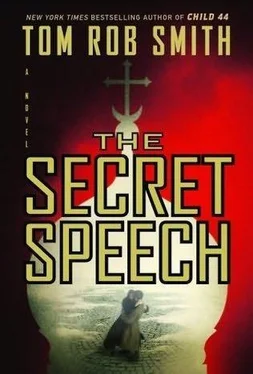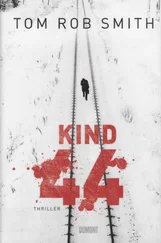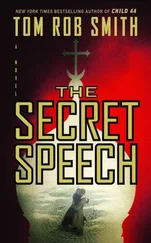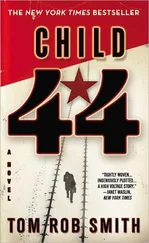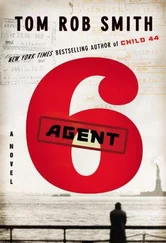Tom Smith - Secret speech
Здесь есть возможность читать онлайн «Tom Smith - Secret speech» весь текст электронной книги совершенно бесплатно (целиком полную версию без сокращений). В некоторых случаях можно слушать аудио, скачать через торрент в формате fb2 и присутствует краткое содержание. Жанр: Триллер, на английском языке. Описание произведения, (предисловие) а так же отзывы посетителей доступны на портале библиотеки ЛибКат.
- Название:Secret speech
- Автор:
- Жанр:
- Год:неизвестен
- ISBN:нет данных
- Рейтинг книги:5 / 5. Голосов: 1
-
Избранное:Добавить в избранное
- Отзывы:
-
Ваша оценка:
- 100
- 1
- 2
- 3
- 4
- 5
Secret speech: краткое содержание, описание и аннотация
Предлагаем к чтению аннотацию, описание, краткое содержание или предисловие (зависит от того, что написал сам автор книги «Secret speech»). Если вы не нашли необходимую информацию о книге — напишите в комментариях, мы постараемся отыскать её.
Secret speech — читать онлайн бесплатно полную книгу (весь текст) целиком
Ниже представлен текст книги, разбитый по страницам. Система сохранения места последней прочитанной страницы, позволяет с удобством читать онлайн бесплатно книгу «Secret speech», без необходимости каждый раз заново искать на чём Вы остановились. Поставьте закладку, и сможете в любой момент перейти на страницу, на которой закончили чтение.
Интервал:
Закладка:
Religion, like everything else, had to compromise. The pomestny sobor, the council of bishops, had shrewdly put him forward as patriarch. They’d needed someone who could be political, flexible, shrewd, which was why his nomination had been State-approved and why the State had allowed elections in the first place, elections duly rigged in his favor. There had been those who had argued that his election was a violation of Apostolic canon law; church hierarchy was not supposed to be consecrated by secular authorities. To his mind, that was an obscure academic argument at a time when the number of churches had shrunk from twenty thousand to less than a thousand. Were they supposed to disappear altogether, proudly clinging to their principles, as a captain might cling to the mast of his sinking ship? His appointment had been intended to reverse that decline and stem their losses. He’d succeeded. New churches had been built. Priests were trained rather than shot. He’d done what had been required, no more. His actions had never been malicious. And the Church had survived.
Krasikov stood up, weary of these recollections. He picked up the photos and piled them on the fire, watching them curl, blacken, and burn. He’d accepted reprisals were a possibility. There was no way to govern an organization as complex as the Church, managing its relationship with the State, and not create enemies in the process. A cautious man, he’d taken steps to protect himself. Old, infirm, he was patriarch only in name, no longer involved in the day-to-day running of the Church. He now spent much of his time working in a children’s sanctuary he’d founded not far from the Church of the Conception of St. Anna. There were those who considered his sanctuary a dying man’s attempt at redemption. Let them think that. He didn’t care. He enjoyed the work: there was no more mystery than that. The hard graft was done by the younger members of staff while he provided spiritual guidance to the one hundred or so children they had space for, converting them from a path of chiffir addiction, a narcotic derived from tea leaves, to a life of piety. Having dedicated his life to God, a dedication which forbade him from having children of his own, this was compensation of a kind.
He shut the door to his office, locking it, descending the stairs to the main sanctuary hall where the children ate and were schooled. There were four dormitories: two for the girls, two for the boys. There was also a prayer room with a crucifix, icons, and candles-a room where he taught matters of faith. No child could remain in the sanctuary unless they opened themselves to God. If they resisted, refused to believe, they were expelled. There was no shortage of street children to choose from. According to secret State estimates, which he was privy to, some eight hundred thousand homeless children were scattered across the country, mainly concentrated in the major cities- living in train stations or sleeping in alleyways. Some had run away from orphanages, some from forced-labor colonies. Many had traveled in from the countryside, subsisting in the cities like packs of wild dogs- scavenging and stealing. Krasikov wasn’t sentimental. He understood that these children were potentially dangerous and untrustworthy. He therefore employed the services of former Red Army soldiers to keep order. The complex was secure. No one could get in or out without his permission. Everyone was searched upon entry. There were guards inside, circling, and two always on the front door. Ostensibly these men were employed to keep the hundred children in check. However, these men provided a secondary service: they were Krasikov’s bodyguards.
Krasikov surveyed the hall, searching the grateful faces for his newest intake, a young boy, perhaps only thirteen or fourteen years old. He hadn’t given his age, refusing to say very much. The boy had a terrible stammer and a peculiarly adult face as if each year on earth had aged him by three. It was time for the boy’s induction, to decide if he was sincere about his commitment to God.
Krasikov gestured for one of his guards to bring the child over. The boy shied away like a mistreated dog, wary of human contact. He’d been found not far from the sanctuary, in a doorway, huddled in rags, clutching an earthenware figure of a man sitting on the back of a pig, riding the pig as though it were a horse. It was a comic piece of household porcelain, suggesting a provincial background. Once brightly colored, the paint had faded. Remarkably, it was unbroken except for the pig’s chipped left ear. The boy, sinewy and strong, never let it out of his sight and never let it go. It had some sentimental value, perhaps, an object from the boy’s past.
Krasikov smiled at the guard, politely dismissing him. He opened the door to the prayer room, waiting for the boy to follow. The boy didn’t move, clutching his painted man on a pig as tightly as if it were filled with gold.
– You don’t have to do anything you don’t want. However, if you can’t let God into your life, you can’t stay here.
The boy glanced at the other children. They’d stopped what they were doing: watching to see what decision would be made. No one had ever said no. The boy tentatively entered the prayer room. As he passed by Krasikov asked:
– Remind me of your name.
The boy stammered:
– Ser… gei.
Krasikov shut the door behind them. The room had been prepared. Candles were burning. The afternoon light was fading. He knelt before the crucifix, not giving Sergei any instructions, waiting for the boy to join him, a simple test to see if the child had any religious background. Those with experience would join him: those with none would remain by the door. Sergei didn’t move, remaining by the door:
– Many of the children were ignorant when they arrived. That is no crime. You will learn. I hope God will one day take the place of that toy figure you hold so dear.
To Krasikov’s surprise the boy replied by locking the door. Before he could query the action, the boy strode forward, pulling a length of wire from the chipped pig’s ear. At the same time, he raised the earthenware figure above his head, throwing it down with all his strength. Krasikov instinctively turned away, expecting it to hit him. But the porcelain figure missed, smashing at his feet, breaking into several large, uneven pieces. Shocked, he peered at the porcelain fragments. There was something else beside the remains of the pig-cylindrical and black. He bent down, picking it up. It was a flashlight.
Confused, he tried to get up, off his knees. Before he could, a noose slipped over his head, down around his neck-thin steel wire secured in a knot. The boy was holding the other end, coiled around his hand. He tugged: the wire tightened, Krasikov gasped as his breath was squeezed from him. His face turned red, the blood constricted. His fingers slipped over the wire, unable to get underneath. The boy tugged again, speaking in a cool, composed voice with no trace of his previous stammer:
– Answer correctly and you’ll live.
At the entrance to the children’s sanctuary, Leo and Timur were denied access, held back by two guards. Frustrated with the delay, Leo showed the men the photo of Lazar, explaining:
– It’s possible that everyone involved in this man’s arrest is a target. Two men are already dead. If we’re right, the patriarch might be danger.
The guards were unimpressed:
– We’ll pass the message on.
– We need to speak to him.
– Militia or not, the patriarch has given us instructions not to let anyone in.
Commotion broke out upstairs: the sound of shouting. In an instant the guards’ complacency turned to panic. They abandoned their post, climbing the stairs, followed by Leo and Timur, bursting into a large hall filled with children. The staff had huddled around a door, shaking it, unable to get in. The guards joined the fray, taking hold of the door handle, listening to the overlapping explanations:
Читать дальшеИнтервал:
Закладка:
Похожие книги на «Secret speech»
Представляем Вашему вниманию похожие книги на «Secret speech» списком для выбора. Мы отобрали схожую по названию и смыслу литературу в надежде предоставить читателям больше вариантов отыскать новые, интересные, ещё непрочитанные произведения.
Обсуждение, отзывы о книге «Secret speech» и просто собственные мнения читателей. Оставьте ваши комментарии, напишите, что Вы думаете о произведении, его смысле или главных героях. Укажите что конкретно понравилось, а что нет, и почему Вы так считаете.
